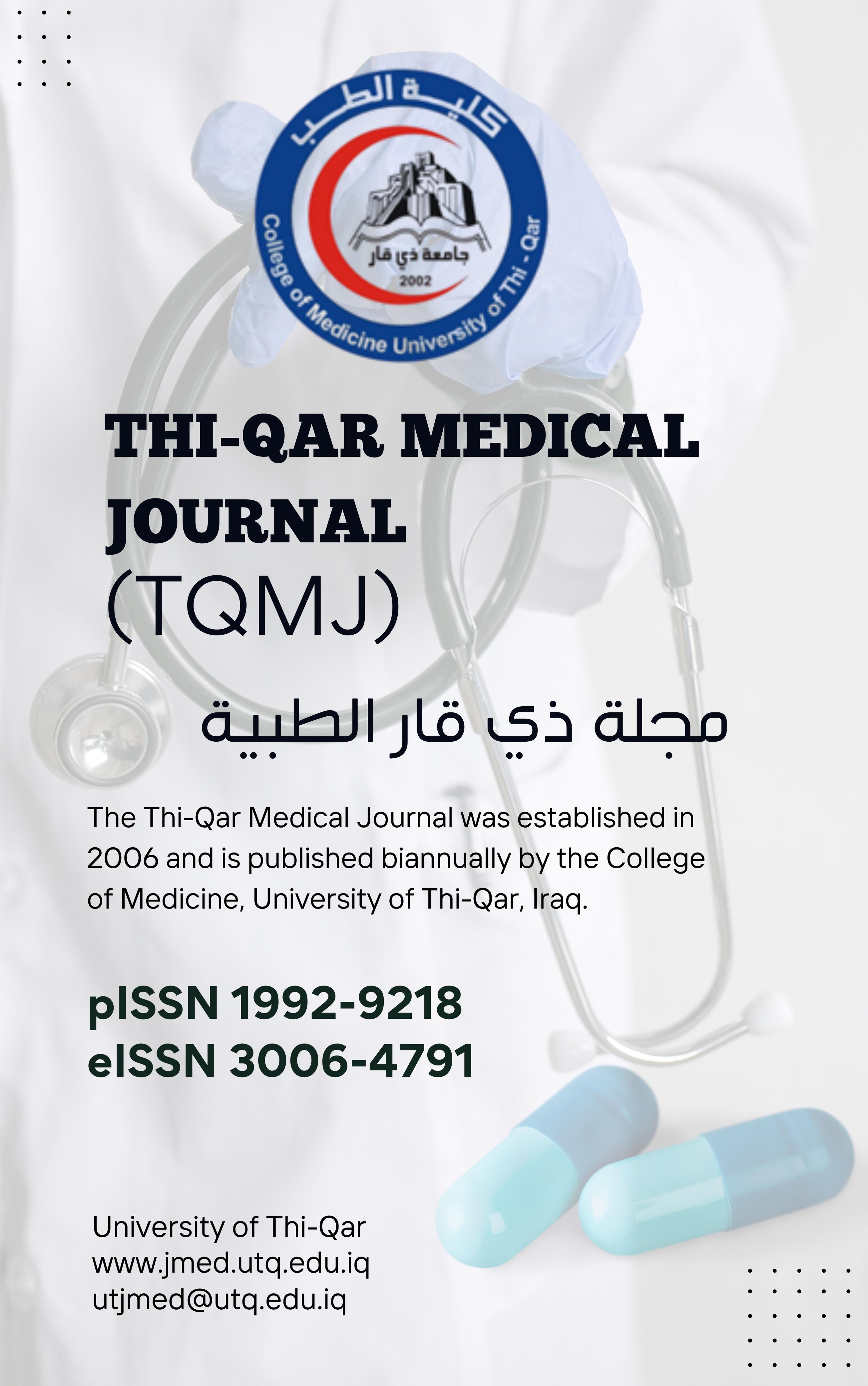Prevalence and Risk Factors of Epistaxis in College of Medicine in Sulaymaniyah
DOI:
https://doi.org/10.32792/jmed.v27i1.528Keywords:
Epistaxis, Nose bleeding, Nasal cavityAbstract
Background: epistaxis is one of the ENT problem that’s common in general population, it canhappen in any age due to variable causes and risk factors ,sometimes doesn’t need treatment while
in severe cases need surgical and medical care
Objective: The aim of this study is to find prevalence and risk factors among the population in
college of medicine in Sulaymaniyah
Patients and Methods: a retrospective cross-sectional study at college of medicine in
Sulaymaniyah university, in which 329 cases enrolled among the cases (students, teacher,
employer) are involved
Result: The prevalence of epistaxis among population in college of medicine in Sulaymaniyah
was found to be 52.9, most of the cases was below 18 years, it usually happened in summer.
Conclusion: Most of cases happen below 18 years, the most common risk factors was nasal trauma
and it usually happens in summer, most of the cases that experienced epistaxis had positive family
history
References
Buchberger AMS, Baumann A, Johnson F, Peters N, Piontek G, Storck K, et al. The role
of oral anticoagulants in epistaxis. European Archives of Oto-Rhino-Laryngology. 2018 Jun
;275(8):2035–43.
Drake LR, Vogl AW, Mitchell A. Gray’s Basic Anatomy. Elsevier [Internet]. 2018 [cited
May 4]; undefined–undefined. Available from:
http://www.mendeley.com/research/87470874-4f12-364b-bdd5-8ed72334639b/
The Endovascular Treatment of Epistaxis. Journal of the Belgian Society of Radiology.
Dec 30;99(2):65–73.
Tunkel DE, Anne S, Payne SC, Ishman SL, Rosenfeld RM, Abramson PJ, et al. Clinical
Practice Guideline: Nosebleed (Epistaxis). Otolaryngology--head and neck surgery : official
journal of American Academy of Otolaryngology-Head and Neck Surgery [Internet]. 2020 [cited
Jan 9];162(1_suppl):S1–38. Available from:
https://www.ncbi.nlm.nih.gov/pubmed/31910111
Systematic literature review of determinants of sedentary behaviour in older adults: a
DEDIPAC study. The international journal of behavioral nutrition and physical activity [Internet].
Oct 6 [cited 2024 Mar 11];12. Available from: https://pubmed.ncbi.nlm.nih.gov/26437960/
Alqarni Z, Alajmi T, Alhumaidi U, Alhussain A, Alotaibi Y, Alzahrani H. Prevalence,
causes, treatment, and outcome of epistaxis. International Journal of Medicine in Developing
Countries. 2019;446–9.
Sarhan NA, Algamal AM. Relationship between epistaxis and hypertension: A cause and
effect or coincidence? Journal of the Saudi Heart Association. 2015 Apr;27(2):79–84.
Ameya G, Biresaw G, Mohammed H, Chebud A, Meskele M, Hussein M, et al. Epistaxis
and Its Associated Factors Among Precollege Students in Southern Ethiopia. Journal of Blood
Medicine. 2021 Jan;Volume 12:1–8.
Alhejaily MA, Alatawi AA, Alatawi MS, Mrighani HO. Evaluation of Knowledge,
Attitude and Practice of Epistaxis among the General Population of Tabuk City, Saudi Arabia. The
Egyptian Journal of Hospital Medicine. 2019 Apr 1;75(1):1923–31.
Bequignon E, Vérillaud B, Robard L, Michel J, Prulière Escabasse V, Crampette L, et al.
Guidelines of the French Society of Otorhinolaryngology (SFORL). First-line treatment of
epistaxis in adults. European Annals of Otorhinolaryngology, Head and Neck Diseases [Internet].
May 1 [cited 2022 Oct 19];134(3):185–9. Available from:
https://www.sciencedirect.com/science/article/pii/S1879729616301661#section-cited-by
McMullin B, Atkinson P, Larivée N, Chin CJ. Examining seasonal variation in epistaxis in
a maritime climate. Journal of Otolaryngology - Head & Neck Surgery [Internet]. 2019 Dec 1
[cited 2024 Feb 13];48(1). Available from:
https://www.ncbi.nlm.nih.gov/pmc/articles/PMC6937692/
Tunkel DE, Holdsworth SM, Alikhaani JD, Monjur TM, Satterfield L. Plain Language
Summary: Nosebleed (Epistaxis). Otolaryngology–Head and Neck Surgery. 2020 Jan;162(1):26–
Krulewitz NA, Fix ML. Epistaxis. Emergency Medicine Clinics of North America. 2019
Feb;37(1):29–39.
Lippincott Journals: Author Resources [Internet]. www.wolterskluwer.com. [cited 2024
May 4]. Available from: https://www.wolterskluwer.com/en/solutions/lippincott-journals/authorresources
Sarhan NA, Algamal AM. Relationship between epistaxis and hypertension: A cause and
effect or coincidence? Journal of the Saudi Heart Association. 2015 Apr;27(2):79–84.
Arshad M, Ahmed Z, Ali L. EPISTAXIS: An experience with over 100 cases [Internet].
[cited 2024 May 4]. Available from: https://www.rmj.org.pk/fulltext/27-1304237972.pdf
Veiga VC, Silva LMCJ, Sady ÉRR, Maia IS, Cavalcanti AB. Epistaxis as a complication
of high-flow nasal cannula therapy in adults. Revista Brasileira de Terapia Intensiva [Internet].
Jan 24 [cited 2024 May 4];33:640–3. Available from:
https://www.scielo.br/j/rbti/a/4Y7jSkTYwYYPyWGfDVwXvnB/?lang=en
Niekrash CE. Anatomy of the Nose and Paranasal Sinuses. Applied Head and Neck
Anatomy for the Facial Cosmetic Surgeon. 2020 Dec 18;79–84.
Kamani T, Sama A. Anatomy and physiology of the nose and paranasal sinuses. 2015 Nov
;
Harkema JR, Carey SA, Wagner JG, Dintzis SM, Liggitt D. Nose, Sinus, Pharynx, and
Larynx. Comparative Anatomy and Histology. 2012;71–94.
Hirsch BE. Gray’s Anatomy: The Anatomical Basis of Clinical Practice. JAMA. 2009 May
;301(17):1825.
O’Connell PR, McCaskie AW, Sayers RD. Bailey and Love’s: SHORT PRACTICE of
SURGERY: 28th EDITION. Bailey and Love’s: Short Practice of Surgery: 28th Edition [Internet].
[cited 2024 May 4];1–1675. Available from: http://www.mendeley.com/research/417c177cc94b-32ae-b711-5786584c8700/
Image 2. Contemporary French and Francophone Studies [Internet]. 2015 [cited 2024 May
;19(4):390–0. Available from: http://www.mendeley.com/research/a2fa4266-89bf-3623-a452-
dd8b49778ac/
1.Epistaxis: Prevailing Factors and Treatment [Internet]. arquivosdeorl.org.br. [cited 2024
Mar 3]. Available from: https://arquivosdeorl.org.br/conteudo/acervo_eng.asp?Id=646
Dizdar O, Onal IK, Ozakn E, Karaklç E, Karadag O, Kalyoncu U, et al. Research for
bleeding tendency in patients presenting with significant epistaxis. Blood Coagulation &
Fibrinolysis. 2007 Jan;18(1):41–3.
S SWD, M RL, A DSIG. Characteristics of Epistaxis Patients at Sanglah General Hospital,
Denpasar from January 2015-December 2016. Biomedical and Pharmacology Journal [Internet].
Mar 25 [cited 2024 May 4];11(1):305–10. Available from:
Downloads
Published
Issue
Section
License
Copyright (c) 2024 University of Thi-Qar Journal Of Medicine

This work is licensed under a Creative Commons Attribution-NonCommercial-NoDerivatives 4.0 International License.




